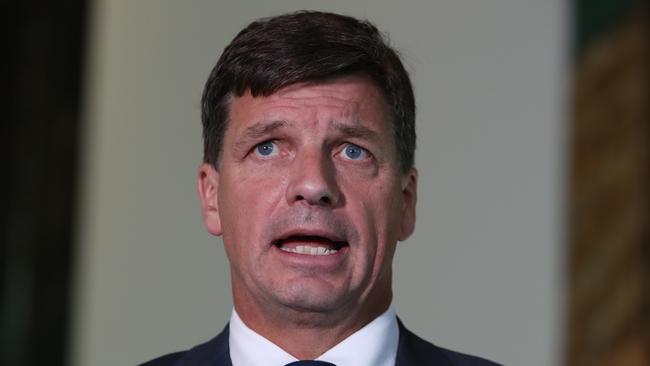Energy firms have months to prepare for ‘big stick’ laws
Electricity giants will be given six months’ grace to prepare for the Morrison government’s ‘big stick’ energy policy.

Electricity giants will be given six months’ grace to prepare for the Morrison government’s “big stick” energy policy that threatens to split up the assets of major power companies.
The big-stick powers will not come into effect until six months after a revised version of the government bill passes both houses of parliament and receives royal assent. With the Senate not due to consider the powers until next month at the earliest, energy giants may not face the penalties — including divestment of their assets — for many months yet.
Energy Minister Angus Taylor said the revised law was delivering on a key election promise “to take action in the energy sector, get prices down and keep supply in the market”. He told The Australian: “The bill will ensure energy companies play by the rules in the retail market by requiring them to pass on cost savings to consumers.
“And if the ACCC finds companies engaged in misconduct, a graduated series of remedies allow appropriate and proportionate action to be taken.
“The Labor Party voted 13 times against this legislation in the last parliament. The big-stick legislation is a crucial test for the opposition: do they stand with the Australian people in wanting to lower power prices or … with the big energy companies?”
Energy giants have been reluctant to fight the big-stick legislation publicly after Scott Morrison’s emphatic election victory in May, and now have more time to prepare for the new regime.
The Business Council of Australia hardened its opposition to the bill after refusing to criticise it over the weekend. BCA chief executive Jennifer Westacott told ABC radio on Tuesday the bill would not reduce energy prices.
“We still oppose them (big-stick powers). We still believe all the risks exist,” she said.
When The Australian asked her position on Sunday, Ms Westacott said the BCA “hadn’t supported that in the past”, but flagged working with the government to improve the bill.
“The government took this to an election. We respect that,” Ms Westacott said on Sunday.
“Our job now is to work really constructively with them to make sure that the legislation achieves what it is intended to do.”
The new bill also enshrines an amendment pushed by independent MP Bob Katter in the last parliament. Any state-owned assets divested under the big-stick powers cannot be passed onto a private enterprise under the change.
Other changes to the bill include limiting individual liability to company directors and senior executives, and clarifying that companies will be punished for not making reasonable price adjustments to market offers.
Liberal MPs raised little opposition to the revised bill in a Coalition partyroom meeting, despite a stoush during backbench committee meetings. Economically dry Liberals feel the interventionist powers of the legislation clash with the party’s free-market philosophies, but most agree it is an election promise that must be passed.
Deputy Opposition Leader Richard Marles and Labor’s Treasury spokesman Jim Chalmers said they would not declare a position until they had seen the full bill.
Additional reporting: Greg Brown



To join the conversation, please log in. Don't have an account? Register
Join the conversation, you are commenting as Logout